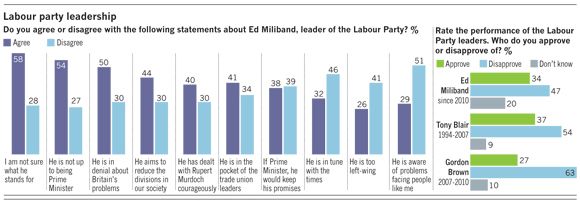
If Ed Miliband fails to become Prime Minister, it won’t be because voters think he is too left wing, or insincere, or lacks courage. It will be because of something bigger, more fundamental—and harder to put right. The people he needs to win over simply don’t think he’s up to the job.
YouGov’s latest poll for Prospect underlines the scale of the challenge that Labour’s leader faces. Millions of voters think the party chose the wrong brother three years ago. Even with David now away from the scene, Ed scarcely wins a vote of confidence from current Labour supporters. True, he leads the field when they are asked which of today’s top Labour MPs would make the best leader. But he scores only 30 per cent. As many as 45 per cent of Labour voters choose someone else, while 25 per cent shrug their shoulders and respond “don’t know.”
When we test a variety of statements about Ed Miliband, a clear pattern emerges. Three negative statements command the widest support—that people don’t know what he stands for, that he’s not up the job of running Britain and that he’s in denial about the need to take tough decisions about taxes and spending.
Now, with more than six in 10 voters supporting the Conservatives, Lib Dems, UKIP or one of the smaller parties, it’s not surprising that so many people think like this. What should worry Miliband is that these views are shared by high numbers of people in two key groups: those who are currently pro-Labour but have not finally decided how to vote next time (13 per cent of all likely voters), and non-Labour people who say they might consider backing the party in 2015 (10 per cent). If Miliband can hold on to the first group and win over some of the second, Labour could win outright; without them, defeat beckons.
In contrast, Miliband wins relatively high marks for standing up to Rupert Murdoch over phone hacking, and for dispelling the early “Red Ed” criticism. And on these points there are only modest differences between firm-Labour, soft-Labour and maybe-Labour voters. It’s not these things, or his sincerity, that make the difference. It’s that the voters that matter don’t think he is tough enough, clear enough or competent enough.

What, then, can he do? Above all he needs to behave like a potential Prime Minister, rather than an argumentative opposition leader, to speak for Britain, not just for Labour; to rise above the partisan bickering with the Tories and leave that to others. But if voters are to be convinced that he is up to the job, Miliband must also show that he has the toughness to deal with his party, sort out the public finances and set a clear course for a future Labour government.
Although YouGov’s research contains serious warnings for Miliband, it also offers one glimmer of hope. We asked people on two separate polls how they rate Miliband’s performance. When we asked this “cold,” immediately after our voting intention question, we found that just 30 per cent approve, while 55 per cent disapprove—a net score of minus 25. But when we warmed people up with the statements (both positive and negative) shown in the graphic below, and then asked people how they rate Labour’s leader, we found that 34 per cent approve, while 47 per cent disapprove: his deficit halves to 13 points.
Even these aren’t great figures, they do suggest that when people focus on Miliband, as they are likely to do in an election campaign, some of the disapproval drops away. Indeed, his net rating is better than those of Tony Blair and Gordon Brown, when people look back today at life before 2010.
MORE ON LABOUR UNDER MILIBAND:
Lost in thought? Ed needs to tell Britain what he’s really thinking—if he knows. Jonathan Derbyshire goes in search of the meaning of Milibandism
Radical Ed:Clare Short on what Miliband has got wrong, and what he needs to do now













